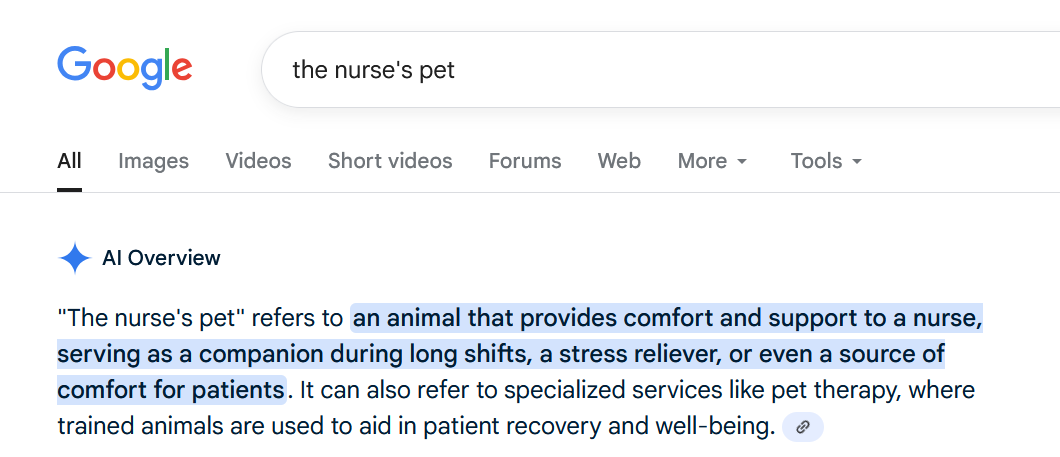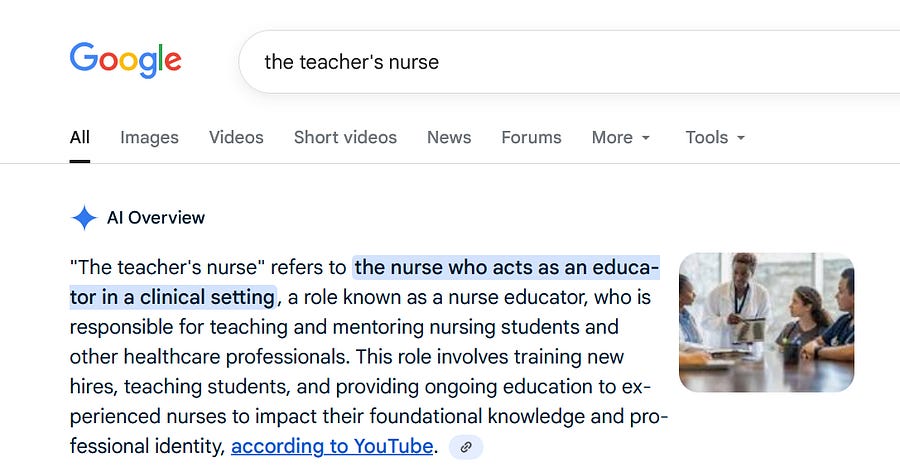Everybody sound the same, commercialize the game
Reminiscin’ when it wasn’t all business
It forgot where it started
So we all gather here for the dearly departed
— Nas
The alternative name for AI slop is internet enshittification.
Cory Doctorow coined the term. It’s how a website gradually erodes its original goal to prioritize making profits at the expense of maximizing quality experience. Top websites gain popularity, then over time dump the initial experience to focus on minting money. Eventually, it degrades over time until it reaches that point when fans remark: I remember back when…
Basically, enshittification is the erosion of the value of a website. AI slop erodes the value one can gain from the internet.
This reminds me of a time when I was the youngest banker in one of Equity’s branches in the heart of Nairobi’s central business district. We were selected because, apparently, our national ranking signaled that we were smart. Equity wanted to have the first stake in the cream of the crop. Strange, because I never felt that way.
Anyway, we were enticed with incentives that came with being the star teller. The minimum transactions should be 150 per day, so they urged us. Make more than that and you are the talk of meetings, the example to be used for the new and the “aging” tellers. Our productivity was high. We could make transactions faster than the most experienced cashiers in the branch. The same would go for my fellow pre-university friends. Preuniversity was the label we were given, as we were yet to begin our campus lives.
We outworked the others by a significant margin. And so we were valued.
We were like AI. Smart and nimble, finding solutions more than seeking problems, young and ambitious rather than aging and complacent. And we were naïve.
By the time I left the bank, I was enlightened. Experience sits at the back, watching an energetic youth learn the hard way. There’ no better way to say it other than the fact that we were being overused and underpaid. I’m not sure what my fellow pre-universities would say, but that was my conclusion.
With AI, there is no need for payment. They don’t launch strikes. They don’t resist adjustments. They don’t ask for a pay increase. They work without tiring, even if they hallucinate. Since they will never go to campus and gain certification, they are the perfect pre-university employees. Smart, industrious, and reliable…ish.
They will make sure that almost everything we consume on the internet turns into a self-fulfilling prophecy. How, you ask? It’s simple.
Overpower and outcompete human-powered content. For one human exclusively run website, there are 99 others solely operated and designed by AI. They are more productive, more efficient, and more recognizable. Human content gets buried in AI sludge.
Google then takes a hit. Google became so popular that the company’s name turned into a verb. Whatever you don’t know can be googled. Their superiority as a search company ran on a statistical model. The sites most visited, for every search query, would rank higher on their pages. It was an easy solution to finding valuable information on the internet. I use the past tense because that is no longer the case. It also ran on the same idea that the successful websites will continue being the successful ones. That’s how the self-fulfilling prophecies happen.
Now we have AI, which has taken over the websites. Every minute, a new AI website with AI operations is being set up because nobody wants to look like a patsy. The gospel is that the cake is too big, yet if you don’t scramble for it, you will be left with crumbs. Better gain the advantage when you still can.
Second-order thinking reveals something different. The only book I have ever read by Howard Marks gave proper meaning to second-order thinking. If a nobody (forgive the term. I use it only to mean that they are not popular) reaches out to you with the promise of heaven through AI, then the cake will not have the returns you wish. It’s pure snake oil. The ones who stand to profit are the creators of the very tool being sold to you.
Tesla rolls out a new product. Everyone is excited about it. Everyone joins the bandwagon. The returns are stretched thin. Tesla wins. The people who joined try to gather the scraps. Same principle.
But worse.
Now Google will not be able to ascertain that the first website on their rank is the most valuable. Reason being that AI is the one which has produced it. AI visits pages, and now, it will be AI ranking itself. It will produce its content, hallucinating while at it, let’s not forget that, and we’re supposed to think it’s valuable because it ranks at the top of Google’s first page. This is merely self-fulfilled prophecy, which AI will continue to believe and which will continue to be peddled to users and consumers who would be none the wiser. The vicious cycle will be difficult to break.
The excuse will be that AI has given us the result. They can scour the entire internet. Who are you to claim to be smarter than AI? Well, what this individual doesn’t know is that they are basically being fed what AI generates, without reasonable negative feedback, in the chain reaction of AI production. Self-fulfilling prophecy trickles down into human cognition. And since AI hardly disagrees with the prompter, the uncritical eyes will continue to create their silo chambers without their knowledge.
All this will be automated. One night you sleep, having wished your online girlfriend or boyfriend a good night, and in the morning, you will find a new AI assistant on your social media platform. Meta introduced it on WhatsApp. X has Grok. Microsoft has CoPilot. Google has AI as the first result for most search queries. And this AI can be pretty creative. Since we want quick results, we’ll mostly rely on what it tells us, even if it’s false. Here’s an example.
I created the phrases, but the AI provided an answer. It sounds convincing, yes? The verbosity does that. It throws words at you until you concede defeat. This indeed must be the meaning of a “nurse’s pet” or a “teacher’s nurse”.
Students could use the phrase, and when the teachers question it, a simple search will convince them that the student was ‘right’ in the first place. The teacher would then concede as well. And that’s how self-fulfilling prophecies creep into our beliefs. The teacher is supposed to guide, but in such a setting, they are considered backward if they don’t agree with such a result. Thanks to AI, shame spreads inside and outside classrooms. Can the teacher know more than AI? Well, that is the fate set for us, unless we set ourselves free from such exploitation.
What I’m doing
I have identified persons whom I can trust and whose analysis is the kind that always conveys the message — I don’t want to be duped.
The first is ensuring you don’t fall victim to the self-fulfilling prophecies through search results. This can be difficult. So, rather than think about the difficulty, we can nurture a mind that sifts the fake and forced from the truthful and valuable. That’s what I’m doing, and it’s by subscribing to valuable voices.
, for instance, is not a fan of AI. Some of his works have apparently been silenced by the big tech companies. Most users of the search engines will hardly come across his articles. His subscribers will. Consistently. Occasionally, he releases articles without pay-walling them. These are articles that he would otherwise shield, but since he believes they will benefit anyone who reads, he publishes them for free.His principle is that of gifting. A gift gains value when shared. The more it’s shared, the more value it amasses. The reverse holds. By limiting it, it turns into a transaction. Presently, the new marketing strategy is to annoy you until you accept the low-ball offer of a premium to access the quality you feel you deserve, but even this is not a guarantee that it will take your annoyance away. Gifts hardly annoy.
By subscribing to Ted Gioia, I can be sure I’m getting real-time and cogent criticism about AI and its impact on the arts. I don’t want to use the term creatives, because it connotes the need to use its most popular prefix — content. I don’t like that word. Content lumps everything into a single idea, which can be shared online. But art is free. Art is found in galleries and in studios. Art is frighteningly beautiful. Online platforms tried to seal it into a single word, but art cannot be packaged. Art is transcendent. AI tries to package art and convert it into slop. In a word, enshittification.
is another publication I would absolutely recommend. One of the most popular articles yet is on the Ghiblification of art. When OpenAI released the feature, the internet lost its creativity. Everything became Ghiblified. Hoel calls it the semantic apocalypse. The loss of meaning by incessant replication. I can trust that whatever Hoel publishes, it was well thought out, with minimal use of AI.’s publication also gives a good overview of the sides to AI we never get to hear about. Any business will mostly focus on its wins and prospects. Again, snake oil. The details underpinning their actions, their shortcomings, and the dark side will remain just that, dark. Individuals like Marcus shed light on some of these dark crevices. will have a special part in this list. Run by a good friend, and one who I can always imagine has to live up to what he writes, it will be a consistent test for him, and for that reason, reassuring enough that he will stay true to the cause. You cannot run a publication on Stoicism without practicing it. Stoicism is the philosophy of the everyday person. And he does not wish, like Marcus Aurelius, to be stained in purple. A constant and worthwhile struggle. is another publication I enjoy reading. Few authors can make me slow down like Pato. I share his work not only on my Substack page, but also on my socials whenever I get the chance. Good work needs to be celebrated and shared. And just like stoicism, the study of man should be done every day. Everyday Living will distill this for you. While AI summarises, Patrick Muindi will heavily dig into the details of behaviour.I also subscribe to
’s Girls. She has an incisive take on the effects of social media on a generation that never knew how to play outdoors. Coupled with her writing is ‘s The Prism. which may take its time with its releases, but will drop bombshells once published. Gurwinder’s work is the kind you can go back and read, again and again, just like Stoicism.I cannot focus so much on the stains of AI without getting a proper understanding of its functions. The rain of AI will continue beating at whatever umbrellas one uses. For this reason, I chose to get the best synthesis on AI from
. One-sided views of AI are not a healthy exercise in discernment. Thus, while I guard myself from the potential ills of AI, I also wish to understand it, to see the magic trick before the performance ends.At the intersection of what AI will do and what we’ll have to do about it, I read
’s Working Theories. She gives compelling treatises on how one can pivot in a landscape whose future we cannot predict. In my view, Anu takes the side of “AI-has-already-won-so-what-can-we-do-about-it?”. From her work, you can begin to see how these ideas can tango unpredictably.Another page I subscribed to is by Kelly Smith on Medium. With a PhD in contextual design and great writing, she gives simple and interesting examples of how design works. You’d learn a lot more about designing, evolution, and marketing from reading her work.
Then there’s beauty. To remind myself of beauty, I wait for
’s and ’s writings. My words will do injustice to how they play with prose. Better visit their websites and see for yourself.The final and most important aspect is simply creating distance between me and social media. Even Substack’s Notes has the bland aftertaste of social media. Upon reflection, I’ve noticed how I spend little time there anymore. In its place are books. I read books. All sorts of books. I cannot trust the books published today, because some may be AI-written, waving that self-fulfilling prophecy card at us. Legendary and legacy authors who have gained relevance from their work may further want to increase productivity by using AI. I hope they don’t.
Thus, my preference is old books. It’s not that I have never known them to be valuable, but that the current air online is that of FOMO — fear of missing out. Ever since I yanked myself free of this nonsense, I have slowed down to the works of those who speak from the grave. Karl Popper forever changed my understanding of philosophy, and this is the right time to sift through other minds from the past. My recent read, by Jose Ortega y Gasset, revealed where the treasures lie. It is with communing with the dead through their written works. This is my biggest guard against the effects of AI. It is also what I wish everyone would resort to if not already doing it. Some may have better strategies than mine. But I cannot survive without reading, hence this detailed article.
Well, what I’m trying to say is…
Meek Mill asks: What’s Free?
His response: Free is when nobody is controlling what we see.
And as J. Cole raps, we need to get free.
Cory Doctorow reiterates, freedom doesn’t have much significance at an individual level. It must be systemic because the impact of AI and social media is systemic. Cory highlights some of these solutions. As you may have guessed it by now, Cory is the other author whose works I will continue to chow.
AI may dominate by suffocating our online experience. And with little room to breathe, I have opted to do what I have already shared.
I hope it helps you take sure steps rather than get tossed and turned by the automated online waves.
And like the steady boulder by the edge of the shore, staying firm and steady despite the rocking waves, may you find a steady foundation, something to cling onto and fight for.
This song inspired some of the lines used in this article. As Nas contemplated a dead industry and what he would do to prevent it from happening, I share what I would do to not fall victim to a dead online experience. Source — YouTube
This song inspired some of the lines used in this article. Source — YouTube
This song inspired some of the lines used in this article. Source — YouTube





Thanks man! Very honored to be selected here with this other great writers.